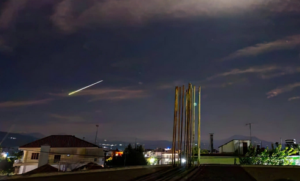The Leonid meteor shower is expected to peak late night on Nov. 16 and Nov. 17 early morning, but will remain active through Nov. 30.
Stargazers can expect a spectacular scene of shooting stars because the Leonids are historically known for their meteor storms rather than showers which can produce at least 1,000 meteors per hour.
During a 1966 Leonid storm, viewers claimed “thousands of meteors per minute fell through Earth’s atmosphere during a 15 minute period,” recorded by NASA. “There were so many meteors seen that they appeared to fall like rain.” The last Leonid storm that took place was in 2002 and is said to occur roughly every 33 years.
PM Mitsotakis formally requests the return of Parthenon Sculptures to Greece (video)
Although a storm spectacle is unlikely to be in effect this year, star searchers can still expect to witness approximately 15 meteors per hour that shoot as fast as 44 miles per second. The Leonids are considered some of the fastest meteors out there, so try not to blink!
Read more: yahoo
Ask me anything
Explore related questions





